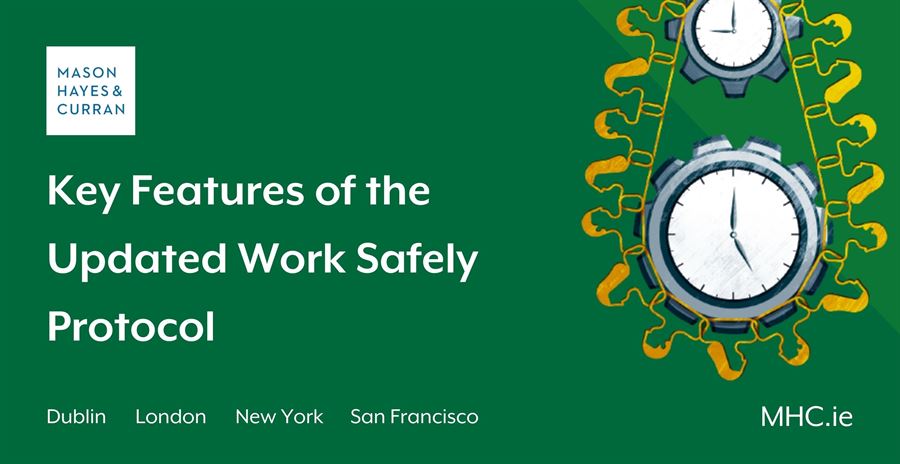Key Features of the Updated Work Safely Protocole

With workplaces reopening across Ireland this week, the Protocol has been updated to reflect the most up-to-date public health advice. A guidance note (the Guidance Note) was also published by the Labour Employer Economic Forum (LEEF) Consultative Group to assist in the phased return to work.
It should be reviewed carefully by employers in preparing to reopen workplaces safely.
The Protocol sets out the minimum public health measures required in every place of work to prevent and reduce the spread of COVID-19. The updates include the inclusion of new symptoms associated with the Delta variant of COVID-19 and additional information on ventilation and vaccinations. While employers are still expected to comply with their normal health and safety obligations, employers should note that from 22 October 2021, the requirement to work from home will be removed and the statutory regime in place to protect public health will be wound down. Further guidance is expected in advance of that date.
Key changes from 20 September 2021:
-
Businesses can begin a phased and staggered return to workplaces for specific business requirements
-
Requirements for two metre social distancing, the wearing of masks in certain circumstances, hygiene measures and appropriate ventilation remain
-
Appropriate attendance levels should be maintained in accordance with the Protocol
-
Use of staggered arrangements should be considered, such as non-fulltime attendance and flexible working hours
-
Each workplace must have a Lead Worker Representative (LWR) that works with the employer to prevent the spread of COVID-19 in the workplace, and
-
The requirement for self-isolation / restricted movements will continue for those with symptoms, who should immediately seek a test, those with positive test results, and close contacts of confirmed cases, unless fully vaccinated with no symptoms
From 22 October 2021
-
Depending on continued satisfactory vaccination rates, the Government intends to remove further statutory restrictions from this date. In particular, the requirement to work from home will be removed, allowing a return to physical attendance in workplaces on a phased and cautious basis, appropriate to each sector.
-
Remote working will become a regular feature of Irish working life as the Government continues to implement Making Remote Work, Ireland’s National Remote Work Strategy, and
-
Legal requirements in relation to social distancing and mask wearing will no longer apply in the majority of circumstances. An emphasis on personal responsibility will be encouraged. This means that employees cannot insist on compliance with social distancing, mask wearing or the provision of sanitising equipment or products in the workplace
Practical Steps for employers
The Health and Safety Authority has produced checklists to assist in the reopening of workplaces. These include measures in relation to rapid antigen testing and what employers can do to prevent the spread of COVID-19 in the workplace. There is an emphasis on maximising ventilation in areas where people are in close contact.
Employers should consult with the LWR and employees in the workplace to ensure that all necessary steps are in place in the workplace to prevent the spread of COVID-19. In particular, employers should consult the new Employer Checklist No 9 – Returning to the Office in preparing for the return.
For example, employees should complete a Pre-Return to Work form before they return to work to determine if individuals have symptoms of COVID-19. Employers should also have measures in place for dealing with suspected cases of COVID-19 in the workplace and isolation procedures.
Conclusion
Overall, the return to work should be appropriate to the specific circumstances of the individual sector or workplace. In general, the return should be conducted in a cautious manner, in consultation with employees. The government is moving to a focus on personal responsibility from 22 October 2021. In advance of this date, the Government will consult with employers and trade union representatives through LEEF to prepare guidance for the next phase of easing public health restrictions.
For more information or if you would like to discuss the continuing impact of COVID-19 on your business, contact a member of our Employment & Benefits team.
The content of this article is provided for information purposes only and does not constitute legal or other advice.
Share this:




